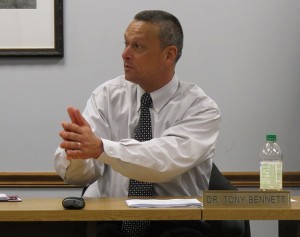'REPA II' Redux: What's Changed In The Teacher Licensure Proposal Since The Public Weighed In

Elle Moxley / StateImpact Indiana
State superintendent Tony Bennett speaks during the State Board of Education's meeting in October.
After months of debate, sweeping changes to the state rules governing how Indiana educators earn licenses and certifications could get a final up-or-down vote from the State Board of Education later this week.
(Bear with us, non-wonky readers. We’re about to get wonky. But this is a pretty big deal.)
Known in shorthand as “REPA II,” state education officials have advocated for the changes as a means of providing more flexibility to administrators in the teacher hiring process.
Debate over the proposal has been contentious. Opponents fear the rules would “de-professionalize” Indiana’s teaching ranks. They’ve called for the State Board to table REPA II out of deference to state superintendent-elect Glenda Ritz, who also opposes the proposed changes.
But on Friday, state education officials also unveiled several changes to the proposal — which doesn’t require a General Assembly vote to become official policy — that dial back a few of REPA II’s most controversial points.
Upon cursory first glance, a few of the changes — as outlined by Indiana Department of Education officials here — stick out:- Evaluations. State education officials have removed language that would have coupled teacher evaluation data with most teachers’ ability to renew their licenses. (The proposal retains the “adjunct permit,” which would allow anyone who earned a four-year college degree with a 3.0 GPA to earn a credential allowing them hold a teaching job, provided they can pass an exam first. In that case, evaluation data would still be used to determine whether an adjunct permit-holder could retain his license.)
- Content Area Exams. Teachers have long earned content area licenses in subjects from social studies to psychology to family and consumer sciences. State officials wanted to allow teachers who already held a license to be able to add a certification to teach additional subject areas by simply taking a test. In some areas, the proposal still allows for teachers to ‘test in’ in this manner. But after “recognizing a high volume of concerns expressed during public comment” about this provision, state education officials added several limits to this provision. Now, teachers will not be able to add content areas for “exceptional needs/special education… communication disorders, elementary education, and early childhood education” by only taking a test.
- Emergency Permits. Because “public comments expressed concern about training and accountability for teachers holding emergency permits,” state officials added a requirement that teachers receiving emergency permits must have a Bachelors degree and be taking coursework that has them on track for full licensure.
- Administrator Licensure. State officials tweaked the language in several portions of the proposal that emphasize experience in higher education, such as here in the portion explaining changes to a section on administrator licensure:
Changing the teaching experience prerequisite will open access to school administration to license holders with higher education experience. The elimination of the Ed.S. degree for superintendent licensure will open up access to district leadership positions while maintaining a level of preparation and academic credentials commensurate with the responsibility and authority held by a superintendent. For those uniquely qualified individuals who may not hold graduate degrees but who have the knowledge, skills and experience for school or district administration, a local school board may apply for a Temporary BLA or Temporary Superintendent license.
- State Board Authority. The redone proposal “shift[s] the authority for approving programs from IDOE to the [State Board of Education].” State officials say this is “consistent with public comment.”
A word about procedure: REPA II is being considered through the executive rule-making process. It’s a lengthy process, requiring an executive agency to publish proposed rule changes well beforehand, allowing for a period of public comment. After the executive branch department makes changes, state officials change the proposal based on the comments and put the changes to an executive panel — in this case, the State Board of Education, for a vote.
Here’s the Indiana Department of Education’s outline of the proposed changes:
[documentcloud url=https://www.documentcloud.org/documents/527268-indiana-teacher-licensure-rules-the-proposal-and.html format=normal sidebar=false ]



